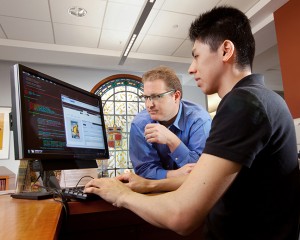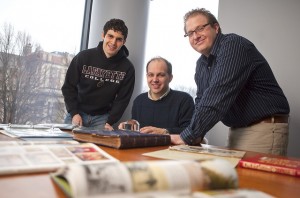
Eric Luhrs, digital initiatives librarian, has developed a one-of-a-kind software program that allows scholars and librarians to collaborate on the creation of metadata, the descriptive information that is used when searching electronic resources.
“Digital collections are often created by people who understand the complexity of delivering information electronically, but who may lack specialized knowledge of the material being digitized. So you end up with vague descriptions like ‘Dock scene’ when a subject specialist would describe the same image as ‘Rice-exporting port of Gunsan, Korea.’ Now I can bring in scholars who know everything about the subject matter, and allow them to work together with librarians and technicians,” Luhrs says.
Luhrs is responsible for designing, building, and maintaining digital collections and tools for the College. He created MetaDB as a tool that would help organize his efforts. The current version has been released as Open Source software, and is available for download on the MetaDB project webpage.
MetaDB performs four primary functions: it provides remote access to librarians, catalogers, and subject specialists working to provide public access to non-circulating items from Lafayette’s Special Collections; it allows the construction of stronger research collections by drawing on expert knowledge from other parts of campus, and beyond; it automates many of the repetitive tasks associated with the creation and management of digital image collections; and it assists with the preservation of digital assets by storing information in structured data formats that are more easily repurposed as online delivery systems evolve.
“This project represents a unique collaboration between librarians, faculty, and students and is the kind of technological innovation for which Lafayette would like to be known,” says Neil McElroy, dean of libraries and information technology services.
Luhrs has been working on MetaDB, in one form or another, for the past four years. The project’s development also has a strong academic component. In 2008, he enlisted the help of students in the Database Design course taught by Jeff Pfaffmann, associate professor of computer science.
Two of those students, Long Ho ’10 (Hanoi, Vietnam) and Miguel Haruki Yamaguchi ’11 (Akashi, Japan), continued to work on the project after the class was complete. With their assistance over the next two years, Luhrs arrived at the current version of MetaDB.
“This type of mentoring is an important part of our academic mission, so I consider it time very well spent,” says Luhrs. “Both students report that job interviewers were quite interested in this project because it gave them some real world experience.”
MetaDB has another benefit: with more relevant material for Google to index, public traffic to the College’s digital collections increases.
By making this material public, and more easily accessible to internet search engines, several people have found Lafayette, and then donated related material to the college’s collections, Luhrs says.
“This is really important, because historians, for example, can spend entire careers learning about a particular person, what they did, where they did it, and who was in their circle of family, friends, and colleagues. But now the family, friends, and colleagues are finding us, and providing new material that allows us to expand the historical record,” he says.

Paul Barclay, associate professor of history, has worked with Luhrs on the East Asia Image Collection, which has grown over the years to encompass several types of media from all over Asia.
Barclay says, “MetaDB allows me to enter descriptions and publication information as metadata for particular images directly from libraries in Taiwan or Japan, without any concern about data loss, and with the full benefit of special features like menus tailored to my own research interests. My colleagues from other institutions are impressed with MetaDB and the collections we have created with it.”
Other academic institutions, including Lehigh University and Muhlenberg College, have expressed interest in the software. “MetaDB fills an important gap in digital workflow, and I believe others will realize the potential that this system has,” Luhrs says.

